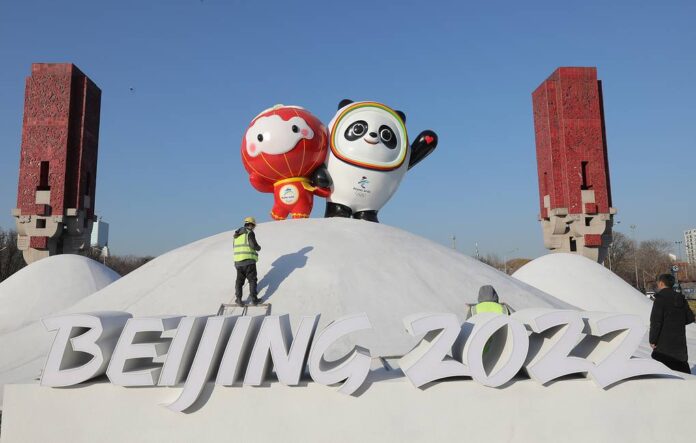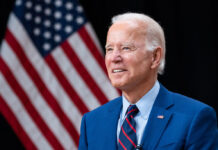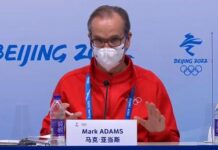
BEIJING — More than three days after the conclusion of the team figure skating competition at the 2022 Winter Olympics, and nearly 48 hours after the originally-scheduled victory ceremony, the teams involved have still not received their medals – and it’s possible they won’t before the Games end.
And none of the relevant sports organizations are ready to disclose why.
USA TODAY Sports columnist Christine Brennan reported Wednesday that the medal ceremony was delayed because of a positive drug test within the Russian team – and that officials have been told the athlete involved is a minor. The only minor on the Russian team is 15-year-old Kamila Valieva, the gold-medal favorite in the women’s individual competition. (Inside The Games, a website that covers Olympic sports, first reported the news.)
Here’s what else we know about the situation – including what governing bodies such as the International Olympic Committee and International Skating Union have (and haven’t) said about it as of Thursday evening in Beijing.
How did we learn about the delay?
The last events of team competition took place Monday morning in Beijing and were followed by a ceremony immediately thereafter. Russia won gold in dominant fashion, followed by the U.S. and Japan, respectively. At the ceremony, athletes were invited onto a podium but did not receive their medals, only ceremonial panda figurines.
The official medal ceremony was scheduled for the following night, on Tuesday, but athletes were informed moments before departing that it had been delayed.
The next day, IOC spokesperson Mark Adams acknowledged the delay at a news conference but did not offer much detail. He said only that there was an “emerging issue” that required “legal consultation with the IOC.”
“We have athletes that have won medals involved,” Adams said.
Who is Kamila Valieva?
Valieva is, simply put, the best female figure skater in the world.
Part of the so-called “quad squad” of elite female Russian skaters, Valieva has the distinction of being the reigning European and Russian champion. So far this season, she has broken the world records for both short and long program score – and then re-broken her own marks. She has also landed jumps in competition that few women even attempt, including the quad toe loop, quad salchow and notorious triple axel.
Valieva effectively clinched Russia’s win in the team performance and is the clear favorite to win individual gold.
She, like other Russian skaters, has largely avoided speaking with Western media while in Beijing. But she was seen at practice Thursday.
“She is not suspended,” Olga Ermolina, a spokesperson for the Russian figure skating federation, said according to the Associated Press.
Valieva is coached by Eteri Tutberidze, a well-known Russian coach who counts multiple world champions and Olympic medalists among her pupils. But at least one of her former skaters, Polina Shuboderova, has described Tutberidze as using extreme methods – such as pressuring skaters to train with minor injuries or requiring them to stay within a half pound of a target weight.
TASS, a Russian news agency, reported that Tutberidze responded to questions about Valieva on Thursday by saying, “I don’t deal with gossip.”
What substance prompted the positive test?
Russian newspaper RBC is among the media outlets reporting that Valieva tested positive for a substance called trimetazidine, a heart medication used to treat angina and vertigo symptoms.
The World Anti-Doping Agency added trimetazidine to its prohibited list in 2014 because it can improve endurance and blood flow. A WADA document cautions that trace amounts of the drug can be found in a type of medication used to treat migraine headaches.
RBC reported that the positive test at issue with Valieva was taken in December.
What has the IOC said?
When asked about media reports regarding Valieva, and a positive doping test, Adams said Thursday that he had no additional information.
“I’m not going to comment on all sorts of speculation,” he said.
He declined to answer multiple follow-up questions about the issue.
What have the ISU, other organizations said?
The ISU, which oversees figure skating, released a statement Thursday but did not offer much insight.
“Referring to the recent media reports, relating to the Figure Skating Team Event, the International Skating Union cannot disclose any information about any possible Anti-Doping rule violation,” the statement reads. “This is in line with the ISU Anti-Doping Rules and IOC Anti-Doping Rules for Beijing 2022. The ISU will therefore not make further comments at this time.”
The Russian Olympic Committee has not replied to an email from USA TODAY Sports seeking comment. A spokesperson for the Kremlin, Dmitry Peskov, has referred reporters to the IOC.
“As always, not knowing the essence, everyone began to yell left and right. We will not join this orderly line of screamers,” he said, according to the Associated Press.
What makes this case unique?
Beyond the high-profile nature of the athlete involved, there are a few other key wrinkles worth mentioning.
First, the obvious: It involves an athlete from Russia, which is competing in Beijing under the name “Russian Olympic Committee” as part of sanctions for its state-sponsored doping program. WADA investigators found that, among other things, Russian agents helped swap dirty urine samples for clean ones by passing them through a hole in the wall at the 2014 Olympics in Sochi.
Second is Valieva’s age. Anyone under 16 is considered a “protected person” under WADA’s anti-doping code, which means they are subject to lighter penalties and possibly exempt from public disclosure regulations.
The code stipulates that it is optional to publicly announce anti-doping violations involving protected persons, and that such announcements “shall be proportionate to the facts and circumstances of the case.”
What have athletes been told?
Several of the team medalists told USA TODAY Sports on Wednesday they didn’t find out about the delay until moments before they were set to head to the ceremony and were not told why it was delayed.
“We’re also very curious as to the status of everything,” Japanese ice dancer Tim Koleto said Wednesday afternoon.
“Do you know something?” his partner, Misato Komatsubara, asked a reporter.
Several American skaters said they were also in the dark.
“We haven’t really heard anything,” Zachary Donohue said Wednesday. “We trust the people both in the IOC, ISU and all the federations involved to sort out whatever needs to be sorted out. And when it’s the appropriate time to let us know, we’ll know.”
Adams was asked Thursday about whether the delay of the ceremony, and mystery surrounding it, is fair to the athletes involved.
“We ask for and hope for the patience and understanding of all the athletes involved here,” Adams said. “But it is a legal case. I am bound by that legal case … and I am unable to say anything more.”
What happens now?
If we’re reading the proverbial tea leaves here, it’s likely that any sort of anti-doping issue would be appealed, and that such an appeal would be heard by the Swiss-based Court of Arbitration for Sport (CAS), which generally offers the final say on international sports disputes.
In normal times, it can take weeks or months for CAS arbitrators to hold a hearing and release their decision. However, at the Beijing Games, CAS has opened offices as part of an ad hoc division to more quickly deal with any issues that might arise. The ad hoc division has already issued several decisions since the start of the Games.
Contributing: Christine Brennan; The Associated Press
Contact Tom Schad at tschad@usatoday.com or on Twitter @Tom_Schad.


















